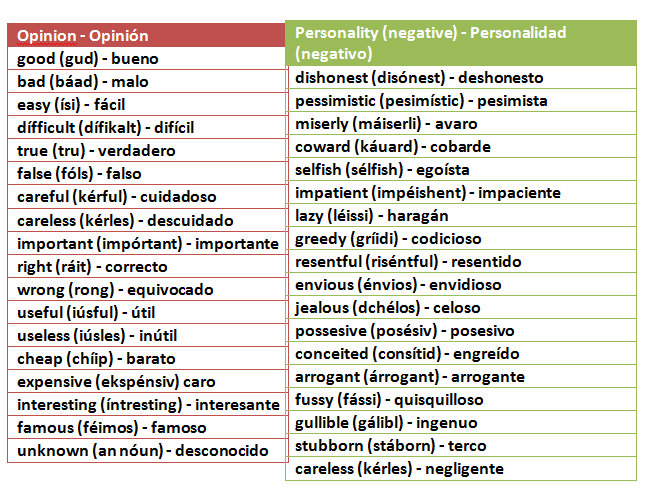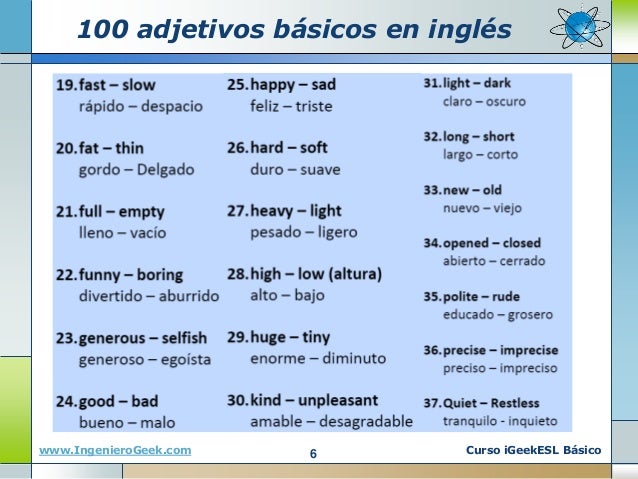
Mi english taller
Authors: Maria fernanda fragoso Gomez
and Alma Dennia Castañeda
- adjetive
- comparative
- superlative
- past tense
- regular verbs: pronunsation, irregula and use ED
- use going to
ADJETIVES
- In this section we will see some adjectives in an easy and fun way
The adjectives are those words that join a name to expand, complement and quantify their meaning.
In English there are eight kinds of adjectives:
1. Qualifiers: good, good; thin, thin; dry, dry; bad, bad; short short
2. Demonstrative: this, this; that, that; these, these; those, those
3. Distributive: each, each; every, everything; either, one and the other; neither, neither one nor the other.
4. Of quantity: some, some; any, any; little, little; few, few; many, many; much, much; enough, enough
5. Interrogative: which ?, which ?; What? What? whose ?, from whom ?, etc.
6. Possessives: my, my; your, your, your, your, his, his (his); her, his (her); its, its (of it), ours, ours; your, yours, their, yours (their)
7. Own: French, French; English, English; Spanish, Spanish; etc.
8. Numerals: one, one; ten, ten; first, first, second, second; etc.
 a page where you will be more adjetives
a page where you will be more adjetives
https://www.aprendemasingles.com/2012/06/12/lista-de-60-adjetivos-comunes-con-traduccion-pdf/

page where of adjective exercises
https://www.curso-ingles.com/practicar/ejercicios/adjectives
comparativos y superlativos
the adjectives of two syllables can form the comparative by adding -er, as the adjectives of a syllable, or by placing more in front of the adjective, as it happens with those of three syllables. Likewise, these adjectives can form the superlative by adding the ending -est or by putting most in front of the adjective.

- Cold, colder (frío, más frío)
- Big, bigger (grande, más grande)
- Small, smaller (pequeño, más pequeño)
- Short, shorter (corto, más corto)
- Fast, faster (rápido, más rápido)
- Young, younger (joven, más joven)
- Soon, sooner (pronto, más pronto)
- Long, longer (largo, más largo)
- Tall, taller (alto, más alto)
- Old, older (viejo, más viejo)
- Fat, fatter (gordo, más gordo)
- Smart, smarter (inteligente, más inteligente)
- New, newer (nuevo, más nuevo
past tense
- If in the present simple, the verb to be has three forms (am, is, are), in the simple past, it has two: was and were.
- Was corresponds to the first person singular (I) and the third person singular (he, she, it); were used for other people (you, we, they).
| I was at work. | Estaba en el trabajo |
| You were quite ill. | Estuviste realmente enfermo. |
| We were in Scotland last week | Estuvimos en Escocia la semana pasada |
- As can be seen, in the simple past tense, no contraction is formed between the pronoun and the verb to be. Both was and were appear alone.
- example:
| You were in English class. | Estuviste en la clase inglés. |
| It was good. | Fue bueno. |
| They were at home. | Estuvieron en casa |
However, when the phrase is negative, the contraction is made between was and not and were and not:
| I was not | I wasn’t |
| You were not | You weren’t |
| He was not | He wasn’t |
| She was not | She wasn’t |
| It was not | It wasn’t |
| We were not | We weren’t |
| You were not | You weren’t |
| They were not | They weren’t |
example:
| He wasn’t a member of the club. | No era socio del club. |
| It wasn’t cold. | No hacía frío. |
| They weren’t late. | No llegaron tarde. |
As always happens in English, you have to change the order of the phrase to ask the question. With the answer we can make a "linguistic shortcut" when answering with the auxiliary verb, that is, with was or were:
| Pregunta | Respuesta corta |
| Was I at home? | Yes, I was / No, I wasn’t |
| Were you at work? | Yes, you were / No, you weren’t |
| Was he Canadian? | Yes, he was / No, he wasn’t |
| Was she a doctor? | Yes, she was / No, she wasn’t |
| Was it sleeping? | Yes, it was / No, it wasn’t |
| Were we there? | Yes, we were / No, we weren’t |
| Were you ready? | Yes, you were / No, you weren’t |
| Were they studying? | Yes, they were / No, they weren’t |
Here you will find some exercises on the subject
https://www.curso-ingles.com/practicar/ejercicios/comparatives-and-superlatives
fakebook
https://www.classtools.net/FB/1129-5xSucN
https://www.classtools.net/FB/1129-5xSucN








